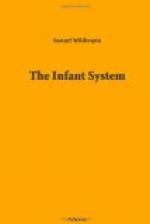I found it necessary, under such circumstances, to enter into a kind of agreement with the mother, that she should not interfere in any respect whatever: that on such conditions, and such only, could the child be admitted; observing, that I should act towards it as if it were my own, but that it must and should be obedient to me; to which the mother has consented, and the child has been taken in again; and, strange to say, in less than a fortnight, has been as good, and has behaved as orderly as any child in the school. But I should deem myself guilty of duplicity and deceit, were I to say that such children, in all cases could be managed without corporal punishment, as it appears to me, that this, in moderation, has been the mode of correcting refractory children, from the earliest ages; for it is expressly said in the Scriptures, “He that spareth his rod, hateth his son, but he that loveth him chasteneth him betimes;” and again, “He that knoweth his Lord’s will, and doeth it not, shall be beaten with many stripes.” There is certainly something very pleasing in the sound, that several hundred infant children may be well managed, kept in good order, and corrected of their bad habits, without any sort of punishment. But as I have not been able to attain to that state of perfection in the art of teaching, I shall lay before the reader what modes of punishment I have adopted, and the success that attended them.
If punishments be judiciously and justly applied, when offences require them, from the earliest periods of life, they will soon cease to be wanted. We cannot form a more important association in the young mind than one between pain and moral evil, and this judicious correction will effect. It should not be given in anger, or it will have the appearance of revenge; but if administered calmly and with feelings of sorrow and regret, it will soon exercise a mighty moral influence. The providence of God applies to us the correction of sickness, pain, and sorrow, to withdraw us from evil; and thus in His moral government, as well as in His Word, He commands us to use the rod; but always for good, and never in anger or cruelty. Recent events have proved to me that there is a mawkish sentimentality but too prevalent on this subject abroad, which interferes greatly with moral training, the proper freedom of the school-master, and even with the administration of public justice.
The first offence deserving punishment which I shall notice, is playing the truant; and I trust I may be permitted to state, that notwithstanding the children are so very young, they frequently, at first, stay away from the school, unknown to their parents; nor is this to be wondered at, when we consider how they have been permitted to range the streets, and get acquainted with other children in similar circumstances. When this is the case, they cannot be brought into order in a moment; it is a work of time, and requires much patience and perseverance to accomplish it effectually.




